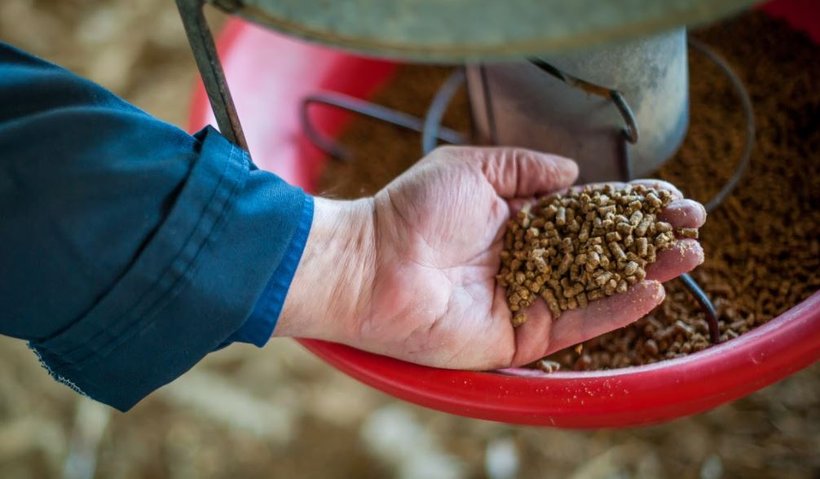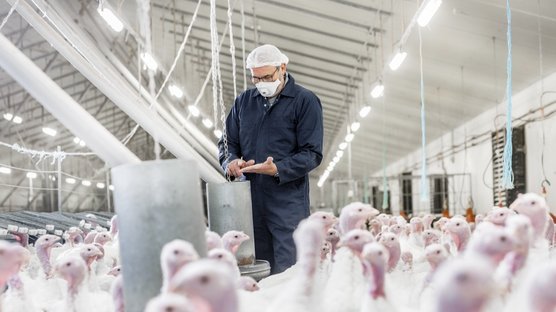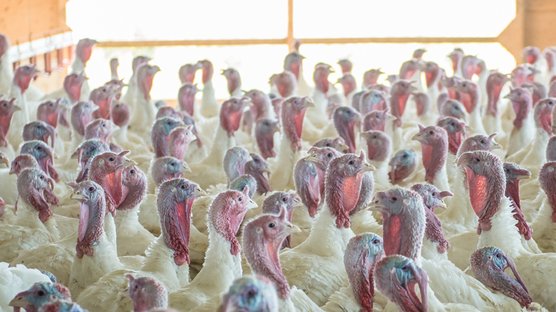
Published on Sept. 26, 2022
The importance of proper turkey nutrition
When it comes to raising turkeys, feed nutrition is a major contributor to the overall cost of production. Therefore, it is important to ensure proper nutrition at the start of a flock to avoid negative, lasting effects on its health and performance.
There are many factors that contribute to successful turkey performance. Not only is it important to start your flock with high-quality turkey genetics and ensure good flock management, but a proper diet also plays a significant role. This article evaluates how to recognize the earliest signs of flock problems caused by nutritional deficiencies, the importance of diets formulated with respect to breed-specific growth curves, and key feed ingredients and their impact on flock performance. Attention to these details will ensure optimal results from your flock.
Recognize the signs and symptoms
Nutrition-based issues become apparent early in life, revealing themselves around 2-4 weeks of age. Symptoms such as poor development of the growth plate in the leg bones can be seen as twisted legs or ‘cowboys’. Improper formulation of minerals in feed can result in tibial dyschondroplasia (TD) and bone mineralization issues like field rickets. Both issues can cause mobility issues which may lead to poor performance and increased mortality.
Improper formulation of diets, specifically regarding calcium, phosphorus and vitamin levels can cause a variety of growth and production problems. It is best to recognize and address these types of problems early, because correcting them later becomes more difficult to accomplish.
Correlation between diets and animal growth curves
Turkey genetics are not all the same and so it is important to understand their different growth profiles. Hybrid Turkey genetics, for example, have a rapid growth rate early in life compared to other competitive genetics. This makes their requirement for feed nutrients from 0-6 weeks of age very critical to ensure every turkey in the flock attains proper bone development to support later growth. Diet formulation and proper phasing of diets are best done in collaboration with your poult-genetic and feed supplier nutritionists. Having the right amounts of ingredients added to feed, provided at the right time, will ensure your flock will successfully grow to its full potential.
A look at key ingredients
Although all ingredients in a diet are essential to ensure your flock will thrive, there are some nutrients that are particularly important in the early stages of life.
Calcium, Vitamin D3, and Phosphorus are all important nutrients involved in the development of strong bones and contribute to the ability of the turkey to grow to its genetic potential. Therefore, it is important to understand how ingredients contribute to overall feed nutrition as excessive or insufficient quantity of a specific ingredient added to feed can have serious consequences on flock performance. Top dressing of some ingredients is common in the industry to try to solve flock problems, however it is important to understand how to safely accomplish this successfully. For instance, calcium supplied as limestone is often ‘topped up’ to help improve leg soundness. The tradeoff is that excessive amounts may reduce phytase enzyme efficacy resulting in greater flock performance problems.
With increased feed costs some may consider decreasing feed nutrient density to save money, but the risks in doing this must be fully understood. Unintended nutrient deficiencies can cause many types of leg problems which affect growth rate and feed conversion.
It is important to understand the needs of your flock at different stages in their growth cycle and to provide the appropriate amount of required nutrients to optimize flock performance and profitability.
Summary
Flock performance is a combination of genetics plus the environment in which they are managed. Hybrid Turkeys is constantly improving the genetic potential for growth, livability and feed conversion of its turkeys. Therefore, it is important to work in close collaboration with your poult genetic supplier to understand the changing nutrient needs of the genetics so that you can achieve the full potential of your turkey flock. Hybrid Turkeys is dedicated to working together with growers to find efficiencies and to address health challenges so we can contribute to a more sustainable industry that will prosper for many years to come.
If you suspect a nutritional deficiency in your flock, the best course of action is to contact your nutritionist in association with a Hybrid Turkeys representative to evaluate how the combination of feed, management and genetics may be affecting the health and performance of your flock.



